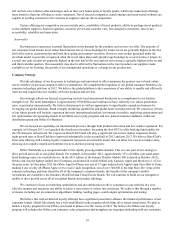Orbitz 2012 Annual Report Download - page 19
Download and view the complete annual report
Please find page 19 of the 2012 Orbitz annual report below. You can navigate through the pages in the report by either clicking on the pages listed below, or by using the keyword search tool below to find specific information within the annual report.19
Online travel agencies: We face significant competition from other online travel agencies, such as Priceline, Expedia,
Travelocity, and their related brands, as well as other regional competitors such as Ctrip in China. We also compete with other
travel agencies for both travelers and the acquisition and retention of supply.
Travel suppliers:Suppliers have increasingly focused on distributing their products through their own websites. For
example, some low-cost airlines, which are having increasing success in the marketplace, distribute their online supply
exclusively through their own websites, and several large hotel chains have combined to establish a single online hotel-search
platform, with links directly to their own websites. Delta Air Lines, Inc. in recent years eliminated sales of airline tickets
through several third-party distributors, limited forward distribution of its fares to meta-search providers such as Kayak, and
limited the extent to which certain fare classes may be used in the construction of multi-carrier itineraries, all in an attempt to
drive customers to book directly on its website. Suppliers may offer advantages for customers to book directly, such as
member-only fares, bonus miles or loyalty points, which could make their offerings more attractive to customers. In response to
these pressures in the past, we and other online travel companies reduced or eliminated domestic booking fees on retail airline
tickets and hotel stays and removed certain change and cancellation fees. Our results of operations could be negatively affected
if competitive dynamics in the industry caused us to reduce further or to eliminate the service fees we charge our customers.
Search engines: We also face increasing competition from search engines like Google, Bing and Yahoo! Search. Search
engines have grown in popularity and may offer comprehensive travel planning or shopping capabilities, which may drive more
traffic directly to the websites of suppliers or competitors. Google appears to have increased its focus on appealing to travel
customers through its launch of Google Places and Google Flights, an air-travel-specific website that promotes air suppliers'
sites and not those of OTCs. In addition, Google's efforts around Google Places could lead to it favoring Google Places or a
favored partner over and above our pages, which could undermine our ability to obtain prominent placement in paid or unpaid
search results at a reasonable cost, or at all. In addition, we currently license our search functionality, QPX Software, from ITA
Software, Inc., a subsidiary of Google. Google's ownership of ITA could result in its developing new software or other products
in the future that it may not make available to us, which could put us at a competitive disadvantage.
Travel meta-search engines and content aggregators: Travel meta-search websites, including Kayak.com (which entered
into a merger agreement with Priceline.com in November 2012) and Trivago.com (in which Expedia has agreed to acquire a
majority ownership interest), and travel research sites that have search functionality, such as TripAdvisor, aggregate travel
search results for a specific itinerary across supplier, travel agent and other websites. If these competitors limit our participation
within their results, it could affect our traffic-generating arrangements in a negative manner. In addition, some meta-search
sites, such as Kayak.com, offer users the ability to make hotel reservations directly on their websites, which may reduce the
amount of traffic and transactions available to us through referrals from these sites.
There can be no assurance that we will be able to compete successfully against any current, emerging and future
competitors or on platforms that may emerge, or provide differentiated products and services to our customer base. Increasing
competition from current and emerging competitors, the introduction of new technologies and the continued expansion of
existing technologies, such as meta-search and other search engine technologies, may force us to make changes to our business
models, which could affect our financial performance and liquidity. Increased competition has resulted in and may continue to
result in reduced margins, as well as loss of customer, transactions and brand recognition.
We rely on search engines and content providers, who may change their business models in ways that could have a negative
impact on our business.
We use Google and other internet search engines to generate traffic to our websites, principally through the purchase of
travel-related keywords. Google and other search engines frequently update and change the logic that determines the placement
and display of results of a user's search. These changes could negatively affect the purchased or algorithmic placement of links
to our websites. In addition, a significant amount of traffic is directed to our websites through our participation in pay-per-click
and display advertising campaigns on search engines, meta-search sites and content properties. Pricing and operating dynamics
for these traffic sources can experience rapid change, both technically and competitively. Moreover, any of these providers
could, for competitive or other purposes, alter their search algorithms or results, causing our websites to place lower in search
query results. If a major search engine changes its algorithms in a manner that negatively affects the search engine ranking,
paid or unpaid, of our websites or that of our third-party distribution partners, or if competitive dynamics impact the costs or
effectiveness of search engine optimization, search engine marketing or other traffic generating arrangements in a negative
manner, our business and financial performance would be adversely affected, potentially to a material extent.
























